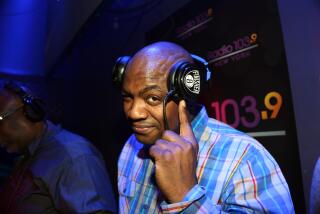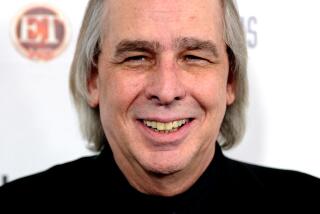Dick ‘Huggy Boy’ Hugg, 78; DJ Introduced White L.A. Listeners to Rhythm & Blues
- Share via
Dick “Huggy Boy” Hugg, a pioneering rhythm and blues disc jockey whose career spanned five decades in Los Angeles radio, has died. He was 78.
Hugg, whose death Wednesday at Long Beach Memorial Hospital was blamed on internal bleeding, had been battling poor health for the last several years largely because of an accidental fall and a stroke, according to friends and colleagues.
Born in Canton, Ohio, Hugg made his way to Los Angeles shortly after World War II to pursue a career in radio. The young man, who would become famous for his smooth baritone voice and playful banter, soon found it.
By the early 1950s, Hugg was broadcasting a late-night show from the window of Dolphin’s of Hollywood record store, then a hot spot for R&B; music. Hugg is credited with exposing white teenagers to Fats Domino, Chuck Berry and Little Richard.
“He was one of the pioneers who first played rhythm and blues,” said Don Barrett, whose laradio.com website tracks local radio. “It came at a time of growing conflict between parents who were listening to Doris Day and their kids who all of a sudden could hear this forbidden sound. Huggy really captured the imagination of young people back then.”
Throughout a radio career that took him to as many as nine local AM and FM stations, Hugg’s programs were so popular with Latino audiences that he often jokingly referred to himself as “the Dick Clark of the Chicanos.”
One of his more famous radio signatures was: “Remember.... Others imitate, but none can duplicate the sound found here.... The Huggy Boy Show must be the best. It’s outlasted all the rest.”
His unusual nickname came from a colleague who had only heard his voice but never seen him. When the staff announcer finally saw Hugg, he reportedly exclaimed: “Why, you’re just a boy, Huggy.” That night the station started promoting the new moniker.
After making as much as $100,000 a year at his peak in the 1950s and early ‘60s, Hugg struggled financially during the ‘70s and ‘80s. Forays into the record and television business never succeeded.
At one point, he told The Times in a 1985 article, he opened a “nudie theater” in Hollywood to help make ends meet.
“I hated it,” Hugg told The Times. “I made $146.88 a week after taxes.... I never wanted to commit suicide or anything, but it was kind of degrading at times. You just keep searching and searching, hoping something will break.”
With the help of disc jockey Art Laboe, Hugg landed a job in 1983 at KRLA-AM (1110), which then had a loose “Oldies” format. Hugg stayed until 1998.
“He loved what he did and he always got a real kick out of it,” said Laboe, whom Hugg often praised for being a major influence on his career.
Hugg’s career in radio ended in 2002 after a stint at KRTH-FM (101.1).
Information on survivors and a memorial service were incomplete Thursday.
More to Read
The biggest entertainment stories
Get our big stories about Hollywood, film, television, music, arts, culture and more right in your inbox as soon as they publish.
You may occasionally receive promotional content from the Los Angeles Times.










